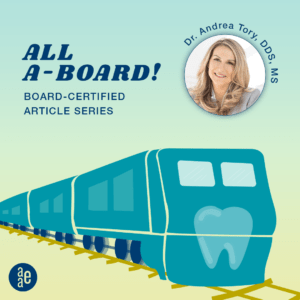‘All A-Board!’ Article Series: Dr. Andrea Tory
 Dr. Andrea Tory, DDS MS, is an endodontist in private practice in Canton, Michigan. She attended the University of Detroit Mercy for both her undergraduate degree and dental school. She served as a general dentist for the United States Army in Germany and Kentucky, then received her endodontic certificate from the University of Louisville.
Dr. Andrea Tory, DDS MS, is an endodontist in private practice in Canton, Michigan. She attended the University of Detroit Mercy for both her undergraduate degree and dental school. She served as a general dentist for the United States Army in Germany and Kentucky, then received her endodontic certificate from the University of Louisville.
Dr. Tory opened Parkside Endodontics in 2022 and has been in solo practice since. Her husband is the general manager of the practice, and they have a two-year-old and a four-year-old son. Hear more about her journey to Board certification!
AAE: Why did you decide to get Board-certified?
Dr. Andrea Tory (AT): Board certification was always strongly encouraged in my residency. My program director sat on the board of directors, and he really wanted us to get Board-certified. He knew it was important for the specialty, so it was pushed from day one. We did a lot of practicing and a lot of mock oral boards. A big part of it was that I wanted to make him proud, but after I got Board-certified, I realized how proud I was of myself. It gives me extra confidence and patients have sought me out because of it. I think it makes you a better endodontist. All the decisions I make are based on research and literature and in the best interest of the patient.
AAE: What was the preparation for the exams like?
AT: I did the written exam right after I graduated in the spring of 2018 and completed the orals in October of that year. It took me a couple of years to get all my cases together because it can be hard to get patients to come back for recalls.
Since I prepared for the written portion when I was still in residency, it was basically just part of the program. Also, to work in Michigan, you must pass the written exam, so I would’ve had to take it regardless. We basically just studied for it like we would for anything else—that wasn’t really a big change for me.
When I took the oral exam, I studied pretty much every day for several months. I was pregnant at the time and didn’t have any kids, so I basically just worked and studied when I got home. It was a process and took a lot of discipline after getting out of residency. It wasn’t that bad—just a few months of intense studying and then I felt like I was ready. It also boils down to the fact that I had just graduated. I think the longer you wait, the harder it is to pass that portion.
AAE: What are the most profound benefits of being Board-certified?
AT: It’s important for the specialty itself. We need a certain amount of people that are Board-certified to remain an ADA-accredited specialty. The most profound benefit for me is personal pride and accomplishment that I reached the highest level that I can in my field. I practice every day based on peer-reviewed research and I feel confident in my decision-making because I know the literature so well. If somebody sees that I’m Board-certified and comes to me, they’re going to get the best care. A lot of endodontists don’t practice evidence-based endodontics, and I think their patients suffer for it.
AAE: What advice would you give to someone who’s on the fence about getting Board-certified?
AT: I think they should look at themselves and ask why it’s important. I think it’s important for the specialty and I know that people come to me because I’m Board-certified. I’m extra proud of myself that I can say that while other endos around me can’t. It’s made me a more confident clinician.




